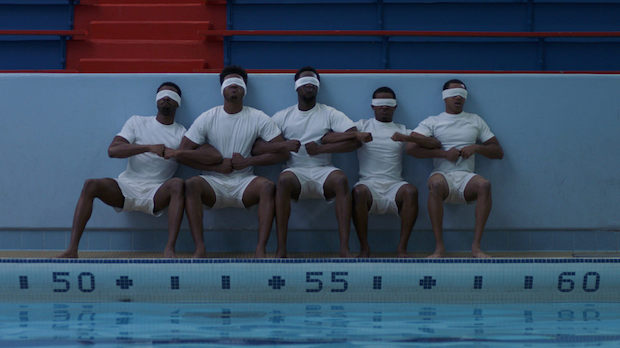 Back to selection
Back to selection
Editor Evan Schrodek on the Fraternity Hazing Drama Burning Sands
 Burning Sands
Burning Sands A producer on Ryan Coogler’s Fruitvale Station, Gerard McMurray makes his debut as a writer/director with Burning Sands. The film tells the story of five college students who embark on a “Hell Week” of hazing and abuse in order to receive admission into a prestigious black fraternity. Evan Schrodek, an editor on The Walking Dead, cut the film after he became friends with McMurray at film school at USC. Below, Schrodek speaks about the film’s nuanced portrait of fraternity hazing, the personal nature of this story and his love of genre filmmaking. Burning Sands premiered at the Sundance Film Festival and will be released by Netflix in March 2017.
Filmmaker: How and why did you wind up being the editor of your film? What were the factors and attributes that led to your being hired for this job?
Schrodek: Gerard McMurray and I met in film school. We both attended the graduate film production program at USC and I always loved his sensibility as a filmmaker. Gerard told me about the project very early in its development and we had stayed in touch in the months leading up to production. It’s a very personal film for Gerard and I was immediately drawn to the incredibly strong core of young actors we had on board. In addition, I loved the overarching themes of masculinity and what it means to be a young man faced with incredibly hard expectations.
Filmmaker: In terms of advancing your film from its earliest assembly to your final cut, what were your goals as an editor? What elements of the film did you want to enhance, or preserve, or tease out or totally reshape?
Schrodek: From the first day of dailies, I wanted to zero in on Zurich’s relationship with the four other guys in his pledge class. The film is all about the bond of brotherhood that takes shape over the course of Hell Week. I wanted audiences to really be with our guys as much as possible, see this world through their eyes. Luckily, Trevor is fantastic and we had a wealth of amazing performances to pull from. We felt the more an audience connected with Zurich, the more we could get them invested in the outcome of the narrative.
Filmmaker: How did you achieve these goals? What types of editing techniques, or processes, or feedback screenings allowed this work to occur?
Schrodek: Gerard and I worked for months in isolation, so it’s always tough to know exactly what you have. We scheduled a number of small five-to-seven person screenings, comprised of fellow filmmakers and various friends. We’d run the film, and follow it up by a long, casual Q&A. Basically, we were trying to figure out what was working and what needed to be lifted or changed. We got some of our very best notes out of those early screenings. It was also great to just sit back and gauge the room, just to figure out if people were locked in at the right moments.
Filmmaker: As an editor, how did you come up in the business, and what influences have affected your work?
Schrodek: After attending film school, I worked primarily as an assistant editor in television. I got one of my bigger breaks when I got the bump to edit on The Walking Dead for AMC. I’m also massive fan of genre filmmaking. Horror, crime, thriller, exploitation, whatever you’ve got I’ll watch it. I think a phenomenal horror scene can teach you a lot about pacing and rhythm in the editing room.
Filmmaker: What editing system did you use, and why?
Schrodek: I’ve cut on Avid for my entire career. I think I first learned to edit using Media Composer in the early 2000s and I’ve stuck with it. The majority of scripted content I encounter is on Avid.
Filmmaker: What was the most difficult scene to cut and why? And how did you do it?
Schrodek: The climactic Hell Night sequence probably posed the biggest challenge. Production had a very limited time to shoot and I think the sun was coming up in those last few takes. Ultimately, in editorial we shuffled a few beats and dug into the pre and post rolls of each shot to create a satisfying conclusion. Our DP, Isiah Donte Lee, did an amazing job capturing the energy and authenticity of that moment. I love how it all came together.
Filmmaker: Finally, now that the process is over, what new meanings has the film taken on for you? What did you discover in the footage that you might not have seen initially, and how does your final understanding of the film differ from the understanding that you began with?
Schrodek: Initially, I felt the film would be a harsh critique of fraternal hazing culture. But it’s much more nuanced. At its forefront, the film examines the bonds that are formed by a tightly knit group of men in an incredibly trying set of circumstances.
